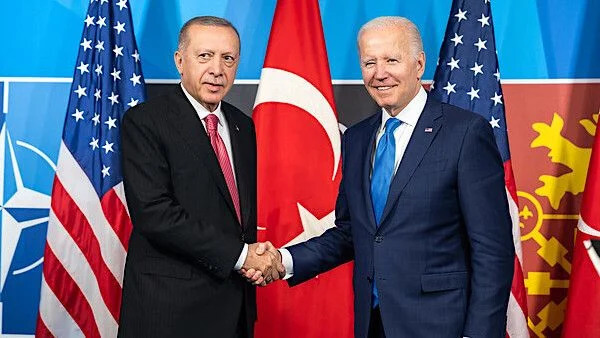Turkey's increasingly authoritarian Islamist leader Recep Tayyip Erdogan said at the opening session of its new parliamentary session Monday that Israel's Prime Minister Benjamin Netanyahu harbored ambitions to invade Turkey and capture Anatolia as part of "Greater Israel."
The Turkish leader claimed (without evidence) Israel's designs stretch further than merely pushing back genocidal enemies from its southern and northern borders – in the form of Hamas and Hezbollah – in Gaza and Lebanon, respectively, and there is, in fact, an intention to invade his country.
It’s no secret where President Erdogan of Turkey stands on Israel, Gaza, Hamas, and the Palestinian cause.
— Yashar Ali ? (@yashar) October 7, 2024
But with his October 7 statement, along with this highly produced video, he is taking things to a whole new level.
Statement by President Recep Tayyip Erdoğan of Turkey:… pic.twitter.com/rz10qJryTg
Erdogan called out Israel, saying "it will sooner or later pay the price for this genocide it has been carrying out for a year and is still continuing," according to an X post. The Islamist leader has a particularly fractious relationship with Netanyahu, with the former frequently labeling the latter the "Butcher of Gaza," and likening him to Hitler. For a man with authoritarian tendencies and a mustache, it is certainly a bold claim to make.
It is a fanciful notion that Israel would attack a state, which has not struck at it, and one it should be recalled is still a NATO member, even if that designation seems ever-more misguided by the day. So, what is Erdogan up to?
There are a number of different interpretations, not necessarily mutually exclusive. In early September, Erdogan called on Islamic or Muslim-majority countries to form an Islamic alliance against Israel, in the wake of the defensive war it has waged, initially against Hamas in Gaza, and now increasingly Hezbollah in Lebanon.
These comments came as Turkey is attempting to join BRICS (which used to simply refer to Brazil, Russia, India, China, and South Africa, but expanded in January 2024 to now include Egypt, Ethiopia, Iran, Saudi Arabia and the United Arab Emirates (UAE.) Despite Turkey's NATO membership, it appears Erdogan is decisively tilting the Eurasian giant away from the West, an impression bolstered by his flirtation with increasingly closer ties to China, via the Shanghai Cooperation Organization.
Meanwhile, trade between Israel and Turkey continues, in spite of the increasingly frosty relationship between Jerusalem and Ankara, some of which stems back to the Mavi Marmara incident in 2010. Even more substantively, however, is the fact Turkey is host to a number of Hamas leaders.
Ismail Haniyeh considered Turkey one of his homes – along with another U.S. ally which seems to sponsor a lot of terrorism, namely Qatar – and it was only the investiture of Iran's President Masoud Pezeshkian that drew him to Tehran … where he was killed in a pinpoint attack, attributed to Israel's Mossad.
According to the Foundation for the Democracy of Freedom, there is also a growing body of evidence Hamas has used funding and weapons supplied by Turkey to plot terrorist attacks against Israel.
Erdogan also made his September statement in the wake of two related developments, both of which have remained unresolved for a decade or more. Turkey broke off diplomatic relations with Egypt in 2013, following Egyptian President Abdel Fattah al-Sisi's — then Egypt's army chief – ouster of Islamist president Mohammed Morsi, whose Muslim Brotherhood is affiliated with Turkey's ruling AKP.
Sisi visited Ankara on Sept. 4, seemingly paving the way for closer relations between these two giants. With Turkey allegedly providing weapons to Hamas and Egypt at best turning a blind eye to all the smuggling the terrorist rulers of Gaza undertook through the Philadelphi corridor, things seem bleak for an increasingly embattled Jewish state.
In early July, Erdogan offered a hand of friendship to Syria's long-term dictator Basher al-Assad, when he invited him, along with Russia's strongman President Vladimir Putin – a backer of the Syrian regime to Turkey for talks. In September, Erdogan explicitly said he was developing contacts with these two countries – both of which border Israel – to check what the Turkish leader termed "Israeli expansionism."
And what does all of this mean for Turkey's reintegration into the F-35 fighter jet program. While it will not be Biden's issue to deal with for long, it would seem from the outside unlikely Turkey will be able to acquire the strategic platform, especially with posturing which seems at odds with U.S. interests. It is, however, not clear how a Harris or Trump administration would handle this issue, in a region that has at least one hot war, which has the potential to break out into something far larger.









